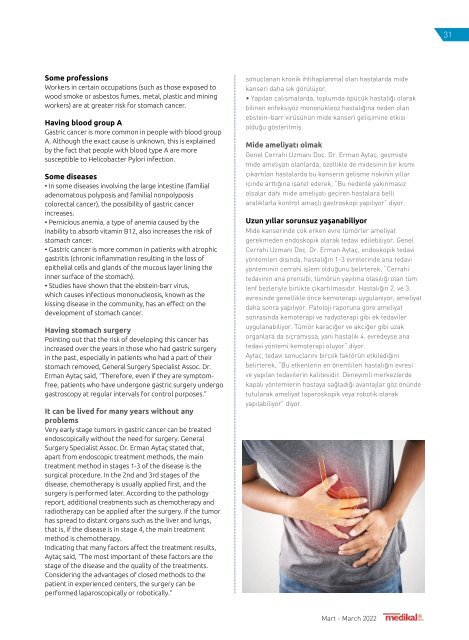Medikal Teknik Mart 2022
Medikal Teknik Mart 2022
Medikal Teknik Mart 2022
You also want an ePaper? Increase the reach of your titles
YUMPU automatically turns print PDFs into web optimized ePapers that Google loves.
31<br />
Some professions<br />
Workers in certain occupations (such as those exposed to<br />
wood smoke or asbestos fumes, metal, plastic and mining<br />
workers) are at greater risk for stomach cancer.<br />
Having blood group A<br />
Gastric cancer is more common in people with blood group<br />
A. Although the exact cause is unknown, this is explained<br />
by the fact that people with blood type A are more<br />
susceptible to Helicobacter Pylori infection.<br />
Some diseases<br />
• In some diseases involving the large intestine (familial<br />
adenomatous polyposis and familial nonpolyposis<br />
colorectal cancer), the possibility of gastric cancer<br />
increases.<br />
• Pernicious anemia, a type of anemia caused by the<br />
inability to absorb vitamin B12, also increases the risk of<br />
stomach cancer.<br />
• Gastric cancer is more common in patients with atrophic<br />
gastritis (chronic inflammation resulting in the loss of<br />
epithelial cells and glands of the mucous layer lining the<br />
inner surface of the stomach).<br />
• Studies have shown that the ebstein-barr virus,<br />
which causes infectious mononucleosis, known as the<br />
kissing disease in the community, has an effect on the<br />
development of stomach cancer.<br />
Having stomach surgery<br />
Pointing out that the risk of developing this cancer has<br />
increased over the years in those who had gastric surgery<br />
in the past, especially in patients who had a part of their<br />
stomach removed, General Surgery Specialist Assoc. Dr.<br />
Erman Aytaç said, “Therefore, even if they are symptomfree,<br />
patients who have undergone gastric surgery undergo<br />
gastroscopy at regular intervals for control purposes.”<br />
It can be lived for many years without any<br />
problems<br />
Very early stage tumors in gastric cancer can be treated<br />
endoscopically without the need for surgery. General<br />
Surgery Specialist Assoc. Dr. Erman Aytaç stated that,<br />
apart from endoscopic treatment methods, the main<br />
treatment method in stages 1-3 of the disease is the<br />
surgical procedure. In the 2nd and 3rd stages of the<br />
disease, chemotherapy is usually applied first, and the<br />
surgery is performed later. According to the pathology<br />
report, additional treatments such as chemotherapy and<br />
radiotherapy can be applied after the surgery. If the tumor<br />
has spread to distant organs such as the liver and lungs,<br />
that is, if the disease is in stage 4, the main treatment<br />
method is chemotherapy.<br />
Indicating that many factors affect the treatment results,<br />
Aytaç said, “The most important of these factors are the<br />
stage of the disease and the quality of the treatments.<br />
Considering the advantages of closed methods to the<br />
patient in experienced centers, the surgery can be<br />
performed laparoscopically or robotically.”<br />
sonuçlanan kronik ihtihaplanma) olan hastalarda mide<br />
kanseri daha sık görülüyor.<br />
• Yapılan çalışmalarda, toplumda öpücük hastalığı olarak<br />
bilinen enfeksiyöz mononükleoz hastalığına neden olan<br />
ebstein–barr virüsünün mide kanseri gelişimine etkisi<br />
olduğu gösterilmiş.<br />
Mide ameliyatı olmak<br />
Genel Cerrahi Uzmanı Doç. Dr. Erman Aytaç, geçmişte<br />
mide ameliyatı olanlarda, özellikle de midesinin bir kısmı<br />
çıkartılan hastalarda bu kanserin gelişme riskinin yıllar<br />
içinde arttığına işaret ederek, “Bu nedenle yakınmasız<br />
olsalar dahi mide ameliyatı geçiren hastalara belli<br />
aralıklarla kontrol amaçlı gastroskopi yapılıyor” diyor.<br />
Uzun yıllar sorunsuz yaşanabiliyor<br />
Mide kanserinde çok erken evre tümörler ameliyat<br />
gerekmeden endoskopik olarak tedavi edilebiliyor. Genel<br />
Cerrahi Uzmanı Doç. Dr. Erman Aytaç, endoskopik tedavi<br />
yöntemleri dışında, hastalığın 1-3 evrelerinde ana tedavi<br />
yönteminin cerrahi işlem olduğunu belirterek, “Cerrahi<br />
tedavinin ana prensibi, tümörün yayılma olasılığı olan tüm<br />
lenf bezleriyle birlikte çıkartılmasıdır. Hastalığın 2. ve 3.<br />
evresinde genellikle önce kemoterapi uygulanıyor, ameliyat<br />
daha sonra yapılıyor. Patoloji raporuna göre ameliyat<br />
sonrasında kemoterapi ve radyoterapi gibi ek tedaviler<br />
uygulanabiliyor. Tümör karaciğer ve akciğer gibi uzak<br />
organlara da sıçramışsa, yani hastalık 4. evredeyse ana<br />
tedavi yöntemi kemoterapi oluyor” diyor.<br />
Aytaç, tedavi sonuçlarını birçok faktörün etkilediğini<br />
belirterek, “Bu etkenlerin en önemlileri hastalığın evresi<br />
ve yapılan tedavilerin kalitesidir. Deneyimli merkezlerde<br />
kapalı yöntemlerin hastaya sağladığı avantajlar göz önünde<br />
tutularak ameliyat laparoskopik veya robotik olarak<br />
yapılabiliyor” diyor.<br />
<strong>Mart</strong> - March <strong>2022</strong>















